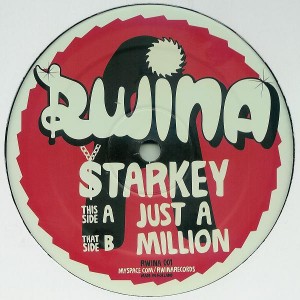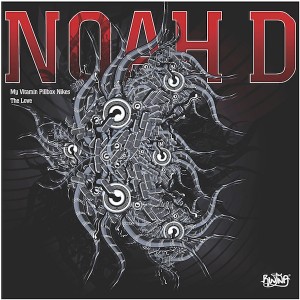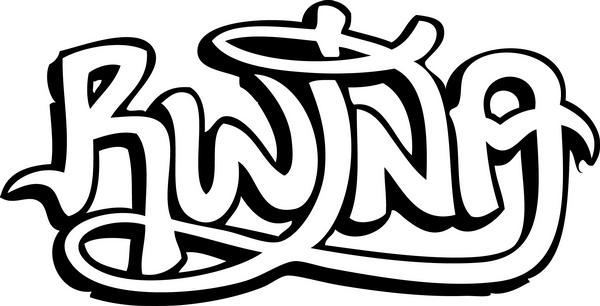Rwina is an odd little label. You might not know Rwina, but if you like melodic bass music, I guarantee you you’ve heard at least one of their tunes played by your favourite DJ recently. The Dutch label has a uniquely skewed outlook on music, with vivid colours and oddly bent corners, a sound that’s fundamentally off-kilter without ever sounding like anything typically described as “wonky.” With an expansive reach between psychedelic hip-hop, dubstep, and instrumental grime, no Rwina release is similar to the previous one but all are united by a hard-to-pin-down common approach, the result of a careful ear and ruthlessly selective A&R.
The ever-growing RWINA family is an international affair and includes a number of smaller names hob-nobbing with the big ones. Kicking things off with a nutso release by Starkey early off in his exploding career and continuing on with two hypercolour dub manifestos by the Glaswegian Taz Buckfaster and some nightmarish hip-hop from Playdoe, Rwina has gone all-out for 2010 with a blitz of jaw-dropping releases from Starkey, Eprom, SRC, Noah D, and Terror Danjah — and that’s just the first six months alone.
Every single one of Rwina’s releases up to this point are worth getting, and each live in their own tie-dye world, a world as gloriously detailed and awe-inspiring as the eye-catching label artwork — seriously, some of these labels have to be seen to be believed. Couple that with a reliable ear for only the best tracks and you’ve got yourself a formidable set of twelves that would be hard to rival by any other label with only six releases to its name.
I spoke with charismatic label owner Akkachar for an enlightening chat about RWINA’s past, present, and bright future, as well as his own personal outlook on the state of music.
Who are you, where are you, what’s your deal?
I’m Akkachar, based in Amsterdam. I run Rwina Records, I make beats, I DJ and on an occasion I put on several nights here in Holland.
What made you want to start to RWINA — what’s the story of the label?
From 2007 I walked around with the idea that I wanted to contribute more instead of just putting on events; I was also getting my hands on unsigned exclusive stuff. So I started plotting from there and in 2008 I had the first Rwina release, by Starkey. I started Rwina to form a platform for the output of my little musical island, which was kind of my mission statement. I want to push the global bass music scene’s boundaries further away from the center. I mean, I have a lot of musical backgrounds. West-Coast hip-hop was the soundtrack of my elementary time. First 2step/garage, and then techno, in my clubbing period. Techno and experimental when I started to DJ, and every style when I started to promote. Plus I have been collecting vinyls from every genre; grime, deep-house, electro, Warp, ambient, minimal, I’ve even got some industrial hardcore. It all comes together in Rwina I guess, and it still evolves.
What exactly does Rwina mean?
Rwina is Moroccan slang for ‘never ending chaos and ‘contradiction’. It’s just a funny word really.

The first release on Rwina Records, Starkey’s “Just A” / “Million”
What’s your relationship with Starkey? You caught him pretty early on in his career.
Starkey drew my attention with his Bounce/Prism release on the sis label of Rag & Bone in 2007. I knew his Lo Dubs release and was rinsing that one too. I really enjoyed his work. Then I heard Million on his Sub FM show. I was blown away. In that time I was shaping up my label. We mailed/phoned a bit and the release was born; “Just A” / “Million.” We did a remix for Playdoe and a single, “Rain City” / “Beatingz” after that Rwina release. It was the right time and right place really, plus the vibe was good. I just saw him last month at a Rwina label showcase.
What is your own personal idea of RWINA’s aesthetic? Would you call it a ‘dubstep’ label?
Nah, I wouldn’t call it a dubstep label, but I think it’s more important what I think that it is. If I would put in a box I would restrict myself. At the end of the day it’s bass music, so I think it is a bass-heavy music label.
What, to you, makes RWINA special? What do you put in a RWINA release that makes it worth buying?
To me the Rwina releases are always full of bass-swagger. They are for the floor, deeper-edged, forward-thinking and all that, but the unique selling point of the releases is that they are grimy without being grime and dubsteppy without being dubstep, and have their own bass-swagger on. I think because most of the tunes are synth-driven and they lean to the G-Funk stuff you can easily see a connection between West-Coast hip-hop or Grime with the Rwina stuff. They are all over the place frequency-wise without being crowded. I always do aim for the freshest bits and I’m not afraid to push a new producer. It’s a clinical and crisp sound. If you close your eyes you must see neon lights, I see them. I think it’s a personal taste of mine, well at this stadium.
What do you look for when scouting out new tracks? What makes something RWINA-worthy?
It depends; sometimes I look for a certain sound and then I find something different and I go with that. Sometimes the producers I’ve worked with provide me with their newest stuff and I’d go with that and other times producers make something that they think would fit Rwina and I don’t go with that. I’m open to everything really and that’s how I approach it. Some frequencies have to be tickled!
To me, RWINA has always leaned a little bit to the grime side. Even if they aren’t full-out grime, the six releases out now have definitely had those elements of grime. Now with releases from SRC and Terror Danjah to come, it seems like you’re embracing a grime sound. Is this a purposeful move? What attracted you to these artists?
I love grime, especially the instrumentals. The SRC thing just happened, I searched him up, we talked a bit and there it was: a stunning EP. He is a new kid on the block, but certainly one to watch. He is on that 8-bit Nintendo tip with some heavy beats and gully melodies.
If you know grime, you know Terror. I approached him and had a good conversation. Then we planned an EP. Saw him last week, where he played the new bits of the EP. They sounded good. There will be more ‘grimy’ artists on Rwina.

RWINA008: an example of the incredible artwork featured on Rwina releases
Are you happy with the way RWINA has turned out? Do you feel as if it’s a success?
Yes, I’m happy with how it turned out, but I wouldn’t call it a success, that’s not up to me. I’m just happy that I can do what I do, it’s a blessing.
Your release schedule has quite suddenly accelerated, is there a reason behind this?
Not a reason, really, except that there is so much exciting music going on. I just go with the flow and to do what I have to do.
File sharing — do you feel it affects RWINA as a business venture? Is it a positive force in the long run or a negative force?
I’m not sure if it is a negative or positive thing. I’ve been told that labels do that themselves to hype the release, but I don’t believe that. Maybe I’ll do that for the next release to see if I’m wrong.
What’s your take on digital vs. vinyl, and do you believe that digital is a legitimate avenue for releasing music or do you just do it because you feel you are forced to by popular demand?
It is a legitimate avenue to release music. I play CDs myself so it would be strange if I said the opposite. But releasing vinyl is contributing! Music has no history without vinyl.
What do you think of the status and purpose of a record label; what is its relevancy to you in a world where tracks can be downloaded for free in seconds?
As a record label you function as a quality control unit for the music you like. When you think it’s worth a release on vinyl, you go for it, which is your main objective. Next to that I also release it digitally, it’s not necessary, it’s an option. It’s something that I want to do to make Rwina music more accessible for a wider audience. So my focus is vinyl, really, and if people share it when it’s available then so be it.
Were there any labels that were particularly an inspiration to you when it comes to running RWINA, or what were some of your favorite, buy-on-sight labels before?
I bought a lot of Hyperdub, DMZ, and Deep Medi, dubstep-wise. I bought almost all Surgeon releases on Counterbalance, Downwards and Dynamic Tension. A lot of Axis, Blueprint, and Tresor things. I do like Rephlex, Warp. and Planet Mu. Bought like every Autechre release, almost all AFX. I still enjoy Modern Love. But it wasn’t something like I also want to do that. It inspires me more to see people getting their own flex on without jumping on a bandwagon.
Is the environment of running a label in this scene competitive or is it more community-minded? Do you feel you are part of something bigger or staking it out alone against a number of people in similar situations?
I don’t think I’m part of something bigger, nor do I think that I’m a one-man-army against the rest. Yeah, I discuss some releases with other labels or maybe help someone out with something, or getting helped, but that’s it.
What’s it like running a label from Amsterdam releasing foreign artists whose scenes are largely based outside of the Netherlands?
Well the scene here in Holland is pretty healthy and a good try out for the upcoming releases that I have. I have artists from all over the world so I spend some time on the phone and mailing.

